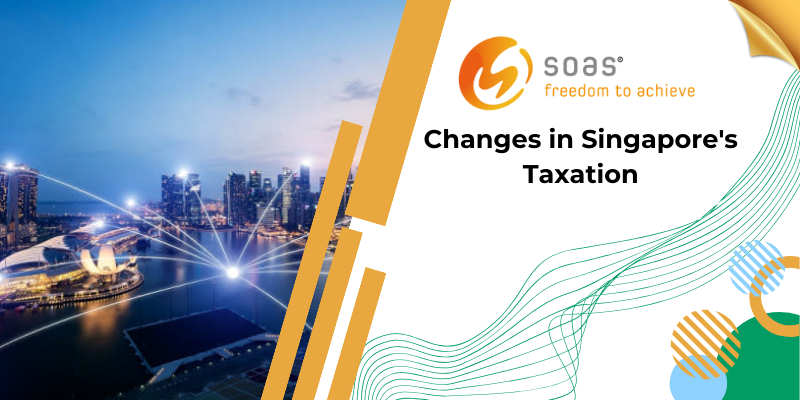Transformative Changes in Singapore’s Taxation: Foreign Sourced Income Regulations Effective January 2024

Singapore is on the brink of a paradigm shift in its tax landscape, marked by the initiation of taxing foreign-sourced disposable gains starting January 1, 2024. With parliamentary approval, amendments to the Income Tax Act have ushered in Section 10L, adding a new dimension to the existing tax framework.
Under Section 10L, capital gains arising from the sale of foreign assets will be subjected to taxation if they find their way into Singapore and if the relevant entity lacks ‘economic substance’ in the country. The assessment of ‘economic substance’ will be conducted on a case-by-case basis. The Ministry of Finance in Singapore has clarified that Section 10L is in alignment with the EU’s Code of Conduct Group Guidance (COGC), a framework established by EU member states to champion a fair tax system.
In contrast to the current system, where foreign-sourced income is taxed only upon receipt in Singapore, and limited to revenue-based sources like dividends, royalties, and interest, the introduction of Section 10L heralds the imposition of a capital gains tax for specific types of entities. This represents a fundamental shift in Singapore’s tax regime.
Key Aspects of Section 10L:
Relevant Entities: Section 10L is applicable to entities within consolidated multinational entity (MNE) groups, with at least one member having a business presence outside of Singapore. Domestic groups are excluded from this provision. Entities falling under specific categories, such as financial institutions or those enjoying income tax exemptions under specific incentives, are also excluded.
Excluded Entities: Entities characterized as ‘pure equity-holding entities’ may be exempted, provided they submit regular accounts, conduct operations in Singapore, and maintain sufficient human resources in the country. Other entities excluded from Section 10L include those managing operations in Singapore with substantial economic substance, considering factors such as the number and qualifications of employees, business expenditure, and key decision-making.
Foreign Assets: Section 10L establishes criteria for identifying ‘foreign assets,’ taking into account the location of company incorporation for shares, physical location for immovable property and intangible movable property, residency for secured or unsecured debt, and the most effective location for upholding ownership rights for intangible movable property.
BEPS 2.0: In alignment with the COGC, Singapore aims to implement a minimum effective tax rate of 15 percent for multinational companies from January 1, 2025, as part of the Base Erosion and Profit Shifting initiative (BEPS 2.0). This global framework seeks to ensure fairer tax distribution for large MNEs through a global minimum tax rate, addressing practices where companies exploit gaps in tax rules to shift profits to low or non-tax locations.
Conclusion:
Singapore’s move to tax foreign-sourced disposable gains from 2024 signifies a significant departure from its current tax structure. The introduction of Section 10L expands taxation to include capital gains for specific entities, aligning with international tax standards and showcasing Singapore’s commitment to maintaining a competitive and equitable tax environment on a global scale.
At SOAS, our seasoned team comprises tax accountants, legal experts, and former tax officials ready to assist across a diverse range of tax services spanning all major industries. Our tax professionals at SOAS possess a profound comprehension of the intricacies within Singapore’s tax landscape.
FAQs - Taxation of Foreign Sourced Income in Singapore Starting January 2024
What is Section 10L, and how does it impact taxation in Singapore?
Section 10L is an amendment to Singapore’s Income Tax Act, effective from January 1, 2024. It introduces taxation on foreign-sourced disposable gains, specifically targeting capital gains from the sale of foreign assets. The tax applies if these gains are received in Singapore and if the relevant entity lacks ‘economic substance.’
How is 'economic substance' determined under Section 10L?
The determination of ‘economic substance’ is made on a case-by-case basis. Factors considered include the business operations conducted by the entity in Singapore, its human resources, and other relevant criteria.
Which entities are subject to Section 10L, and are there any exclusions?
Section 10L applies to entities within consolidated multinational entity (MNE) groups, with at least one member having a business presence outside of Singapore. Exclusions include domestic groups, financial institutions, and entities enjoying income tax exemptions under specific incentives.
What are 'pure equity-holding entities,' and how can they be excluded from Section 10L?
‘Pure equity-holding entities’ primarily hold shares in other entities and derive income only from dividends. To be excluded, these entities must submit regular accounts, conduct operations in Singapore, and maintain adequate human resources in the country.
How does Section 10L define 'foreign assets'?
Foreign assets’ under Section 10L are defined based on various criteria, including the location of company incorporation for shares, physical location for immovable property and intangible movable property, residency for secured or unsecured debt, and the most effective location for upholding ownership rights for intangible movable property.
What is BEPS 2.0, and how does it relate to Singapore's tax system?
BEPS 2.0 stands for the Base Erosion and Profit Shifting initiative, a global framework to ensure fairer tax distribution for multinational companies. Singapore aims to align with the EU’s Code of Conduct Group Guidance and implement a minimum effective tax rate of 15 percent for multinational companies from January 1, 2025, as part of BEPS 2.0.
How does Singapore's taxation system change with the implementation of Section 10L?
Singapore’s tax system undergoes a significant shift with the introduction of Section 10L. Unlike the current regime, which taxes foreign-sourced income only if received in Singapore and is limited to revenue-based sources, Section 10L introduces a capital gains tax for specific entities, reflecting a commitment to international tax standards.
What does the conclusion of the blog highlight about Singapore's tax environment?
The conclusion emphasizes that Singapore’s move to tax foreign-sourced disposable gains from 2024 represents a departure from the current tax structure. The introduction of Section 10L expands taxation to include capital gains for specific entities, aligning with international tax standards and demonstrating Singapore’s commitment to maintaining a competitive and equitable tax environment globally.
